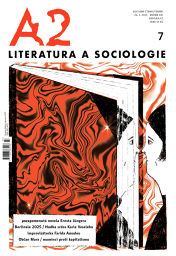We hear about the women in Syrian Rojava rather stereotypically, mainly in connection to their military involvement against the Islamists. But women also enjoy strong presence in the local autonomy. What does the Kurdish feminism look like and how does it reflect the gender theory of the imprisoned leader of the Kurdish worker's party, Abdullah Ocalan?
With the battle of the north Syrian town Kobanî in 2014, daily press provides us with regular news about the advances of the Kurdish troops against the militias of the so called Islamic state. Although due to the blockade by the neighboring states, the territory is not easy to access, media shows great interest in reporting about the daily life of the local residents. But media rarely focus on anything else than armed groups and very infrequently do we get the coverage without an illustration of a fighting woman. The obsession with "beautiful women warriors" reminds of the successful PR campaign of the Israeli army where the militarization of society by the general conscription is presented predominantly as a way to gender equality.
Science about woman
With this said, the Kurdish movement does not limit the idea of gender equality - similarly to the Palestinian kibbutzes at the beginning - only to one social group. The Rojava autonomy is built on the ideas of the founder of the Kurdish worker's party (PKK), Abdullah Öcalan. At the time of its founding, the party did not greatly differ in ideology from other radically leftist projects in Turkey. Like other groups, it invoked the no dogmatic interpretation of Marxism-Leninism and, given the pretty much feudal organization of Kurdish society, it did not avoid Maoism.
In the beginning of 1990s, cases of self-immolation among Kurdish women began to appear a lot more increasingly in addition to the ongoing guerrilla war. Along with stories of "heroic sacrifices," acts such as these soon became the central motive of the new party narrative. Despite the widespread ideological focus, in 1992 Öcalan railed against the first women's congress in PKK and deliberately annulled the results if the gathering. Öcalan's arrest in 1999 marked a significant change in thinking and step toward the current organization of Rojava administration. According to his own words during his stay in prison, reading books on political theory made him realize that the ideology to date is not the answer to contemporary challenges. In addition to democratic confederalism, the main organizational principle of the north Syrian Kurdish administration was the jineolojî concept (science about woman).
To many feminists, the idea of the nearly seventy-year old man as the central figure of feminist theory and struggle for women's rights sounds rather puzzling, if not at all unacceptable. Whether or not Öcalan took credit for the successes that Kurdish women achieved themselves, it cannot be overlooked that during an interview with a woman from a Kurdish movement we hear the name Apo (short for Öcalan's name) rather than, say, the name of one of the founders of PKK, Sakine Cansız. Although as early as at the turn of the century, Turkish-Kurdish parties subscribed to interparty quotas, today's dual leadership in the People's Democratic Party (HDP) in Turkey and all other organizations of Kurdish parties in the region typically derives from the declared jineolojî concept, dating to 2008. Similarly, YPG, the armed part of the Syrian-Kurdish United Democratic Party (PYD), includes a strictly women's fraction YPJ and PKK its counterpart, PAJK.
Equality or militarization?
In the Jineolojî brochure and the magazine of the same name, Kurdish feminism is typically bracketed by a specific interpretation of regional history that does not always correspond with the findings of the mainstream science. Here, feminism is considered to be inseparable from environmentalism and anticapitalism. Frequent motives are the self-sufficient agricultural communities of the historical Mesopotamia where women played central role. Such an interpretation has a decisive significance for Kurdish attempts to transform economic situation, and in Turkey and particularly northern Syria a number of women’s cooperatives, educational projects, and organizations were founded in recent years.
At the impulse of the local administration, women in Diyarbakır’s Sûr founded hand-crafted ateliers, with products such as pickled vegetables or jewelry were distributed into local shops. In addition, women’s groups run an agency that arranges jobs in better-off families to women from poorer parts of the city. Community laundries and women’s academies offering workshops provide safe spaces, and women in need may utilize women’s houses. These differ from the state institutions in that they offer housing for children who would in state-run institutions need to stay with the violent fathers.
The Jinwar initiative, the name in Kurdish means women’s land, works toward combining these activities with environmentalism. The democratically-run village Jinwar should, most of all, serves as a safe space for women facing the pressures of war and patriarchy and forms, in its own way, a tool against the victimization of women, allowing women the greatest degree of self determination.
Whereas it is well known that the Turkish state regularly intervenes against the Kurdish movement, it is less known that even the Kurdish autonomy in Rojava deals with nondemocratic practices. According to some Kurdish organizations, the autonomy puts pressure on independent associations and does not issue licenses permitting their future operation. In the aftermath of law-enforcement intervention against a women’s center in Tel Tamir where the entire center’s equipment was confiscated, women’s initiative Kolishina that considered itself to be independent on any political movement in Amûdê was forced to dissolve. Both groups publicly fought against conscription of the underage into YPG and YPJ.
In light of such a development, the Kurdish movement and predominantly YPJ needs to avoid instrumentalization of gender equality in favor of militarization. Otherwise they risk that they will encounter similar fate as that of the Palestinian kibbutz members whose ideas about equality were also misused by the Israeli governments to freezing of peace talks and in favor of military solution
The author is a student of Near eastern studies.

